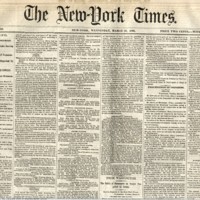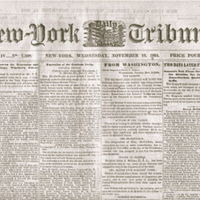The Editor's Civil War
During the time of the increasingly tense crisis months before the Civil War, practically all observers believed that the President Lincoln and the Republicans would begin attacking the South and the slavery as soon as they took power. The “Northern Aggression” was highly recognized and blamed. Successively, historians believe that the Northern press has no freedom in terms of their comments on the Civil War but to follow the President and the mainstream, “to be aggressive”. However, there was an editors’ civil war – leading by two largest newspapers and joined by other local press – in New York City that even had impact on Lincoln’s actions and the progress of the War.
Newspaper editors of all political leanings had a stake in the war and invested heavily in covering it: there were constant conflicts among editors and between editors and politicians[1]. If there wasn’t any freedom of press, it is impossible to create the safe debating and discussing environment among newspapers. Republican leader and New York Times editor Henry J. Raymond and the editor of New York Tribune,Horace Greeley, are representatives of editors holding totally different political views. First of all, even for Greeley himself, his ideology of abolitionism clashed with pacifism throughout the war. He urged Lincoln to hold firm and not compromise with a series of “Stand Firm” editorials.[2] On February 18, 1861, he published in capital letters at the top of an editorial column: “NO COMPROMISE! /NO CONCESSIONS TO TRAITORS! /THE CONSTITUTION AS IT IS!”[3] This display continued every morning until Lincoln’s inauguration on March 4.[4] Therefore, while Raymond sought to keep the Southern States, and used his considerable influence to try to prevent the secession, Greeley published, “Let them go!”
When Greeley continued the call for action, publishing “The Nation’s War Cry: Forward to Richmond!”, saying the army should hold Richmond before the Confederate congress could open there, he received much of the blame for the Union’s humiliating defeat at the first battle of Bull Run July 21, 1861, near Manassas Junction, Virginia, because of his pressure for action.[5] Raymond at the Times accused Greeley of prompting premature action, saying the battle had not been in the army’s plans. On the one hand, it is reasonable to conclude that Greeley’s urgent call for war accelerated the speed of the war. On the other hand, the blames by other editors raised an even further debate about the role and the limitation of the press in the Civil War. Due to the potential large effects that press may have on the decision-making, it is very necessary to practice the freedom wisely.
Greeley wrote an open letter to President Lincoln calling for abolition of slavery in the states that had seceded. The letter asked him not to compromise with the traitors:
“On the face of this wide earth, Mr. President, there is not one disinterested, determined, intelligent champion of the Union cause who does not feel that all attempts to putdown the Rebellion and at the same time uphold its inciting cause are preposterous and futile – that the rebellion, if crushed out tomorrow, would be renewed within a year if slavery were left in full vigor.”[6]
Greeley was attacked from all quarters for having published this public appeal to Lincoln. Bennett’s Herald complained about Greeley’s call for emancipation, saying emancipation would not help “the slaves, who are too contented and too much attached to their masters to revolt against them”.[7] The National Intelligencer called him “arrogant, dictatorial and acrimonious” and said that Greeley “needed a lesson in etiquette”.[8] The open letter, by itself, can already be seen as a heavy leverage for President Lincoln. In addition to the debate it raised, it indeed put lots of pressure on the President to make the a timely decision. President Lincoln’s secretaries kept him informed about what appeared in the major newspapers and he would have certainly been aware of Greeley’s article. More specifically, Francis B. Carpenter, one of his secretaries, told Greeley that the President had a copy of the New York Tribune in his scene of the signing of the Emancipation Proclamation because of Greeley’s influence on the subject.[9]
When the Union was close the success, there raised a new debate of how to deal with the relation with the South. Greeley asked for magnanimity on behalf of the many suffering families: “ What we ask is that the President say, in the South unite to bury its carcass and then clasp hands across the grave.”[10] However, Raymond’s New York Times led an attack on Greeley: The New York Times challenged him directly, saying if Jefferson Davis is caught, he should be hanged, “If we let him go unhung, we must in decency abolish hanging altogether.”[11] Raymond believed that the leader should receive the worst penalties. It is not our responsibility to evaluate whose proposal is better, nor should the final policy depend upon their ideas. However, the different approaches did provide multiple ideas for policy makers. Their ideas reflected thorough interests of all parties that the policy makers should take account in. The freedom of press helped the government systematize the pros and cons with various perspectives. In conclusion, we can clearly see that the “Northern Aggression” is an overgeneralization and oversimplification. There was indeed a great degree of freedom for press, even suggesting President’s move, and the freedom put pressure on the Union government and might have stimulated the President’s military move, release of the Emancipation and policy during the Reconstruction Era.

